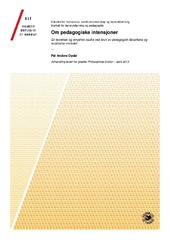Om pedagogiske intensjoner: En teoretisk og empirisk studie ved bruk av pedagogisk-filosofiske og kvalitative metoder
Permanent link
https://hdl.handle.net/10037/12974View/
thesis (PDF)
Opdal, P.A. Inside the Black Box: On the Concepts ‘Teaching’ and ‘Learning’ and the Connections between Them. Manuscript. Published version available in Scandinavian Journal of Educational Research, 64:3, 457-470 (PDF)
Opdal, P.A. (2018). Språk på tomgang? Om ‘læringsutbytte’ i norsk høyere utdanning. Accepted manuscript version. Published version available in Uniped, 41(2),87-105. (PDF)
Opdal, P.A. (2016). Å kunne mer enn man har lært? Om ‘generell kompetanse’ i Nasjonalt kvalifikasjonsrammeverk. Accepted manuscript version. Published version available in Studier i pædagogisk filosofi, 5(2), 62-78. (PDF)
Opdal, P.A. Fra undervisning til læring? Vitenskapelig ansatte reflekterer over egen undervisingshverdag. Accepted manuscript version. Published version available in Nordic Studies in Education (PDF)
Opdal, P.A. Intensjon eller resultat? Om forståelsen av læringsutbytte blant vitenskapelig ansatte i norsk høyere utdanning». Manuscript. (PDF)
Date
2018-06-18Type
Doctoral thesisDoktorgradsavhandling
Author
Opdal, Pål AndersAbstract
Sammendrag: Studien undersøker og analyserer utvalgte pedagogiske intensjoner, det vil si hensikter, formål og ønsker når det gjelder pedagogisk planlegging og praksis. Nasjonalt kvalifikasjonsrammeverk for livslang læring postulerer at:
a) norsk høyere utdanning skal vektlegge læring mer enn undervisning;
b) at undervisningen i norsk høyere utdanning skal baseres på læringsutbytte; og
c) at ‘generell kompetanse’ skal innføres som overordnet læreplankategori i norsk høyere utdanning.
Disse forhold uttrykker intensjoner for pedagogisk planlegging og praksis i norsk høyere utdanning, og det er disse intensjonene som undersøkes og analyseres i studien.
Studiens overordnede formål er todelt:
(i) å bidra til kunnskapsutviklingen når det gjelder angitte intensjoner;
(ii) undersøke hvordan de pedagogiske intensjonene forstås blant de som er satt til å undervise i henhold til dem: vitenskapelig ansatte i norsk høyere utdanning.
Studien følger dermed to spor, et teoretisk og et empirisk. Det teoretiske sporet utgjøres av 3 teoretiske artikler, mens det empiriske sporet utgjøres av 2 artikler hvis innretning er empirisk.
I metodisk forstand er studien en pedagogisk-filosofisk, kvalitativ analyse. I de teoretiske artiklene anvendes primært pedagogisk-filosofiske metoder, mens analyseredskapene i de empiriske artiklene primært har sitt opphav i en kvalitativ intervjutradisjon.
Vesentlige resultater i studien er at et fruktbart begrep om læring avhenger av et tykt (substansielt) begrep om undervisning. Å etterspørre en overgang fra undervisning til læring synes på denne bakgrunn forhastet. Et videre resultat er at «læringsutbytte» er upresist mellom begrepene læringsmål og læringsresultat, det vil si mellom intensjoner om læring, på den ene siden, og resultater av læring, på den annen. Det er dermed vanskelig å regulere en hensiktsmessig bruk for begrepet læringsutbytte i undervisningssammenheng. Når det gjelder begrepet ‘generell kompetanse’ indikerer studiens resultater at det er uklart hva «generell kompetanse» betegner og at det dermed er vanskelig å forstå hvilken funksjon begrepet er tenkt å ha i læreplansammenheng.
Resultatene i de teoretiske artiklene understøttes av resultater i de empiriske: Vitenskapelig ansatte i norsk høyere utdanning rapporterer i liten grad om en overgang fra undervisning til læring. Det er videre uklart for dem hva «læringsutbytte» betegner og hvilken funksjon begrepet er ment å fylle. English summary: The thesis investigates and analyses select pedagogical intentions, that is: purposes, goals, aims, and objectives relating to educational planning and practice. The National Qualifications Framework for life-long learning, the Norwegian footprint of the European Qualifications framework, postulates that:
(i) Norwegian higher education is to focus on learning as opposed to teaching;
(ii) That teaching in Norwegian higher education is to be based on learning outcomes; and
(iii) That “generell kompetanse” (generic skill) be introduced as a parent curricular descriptor in Norwegian higher education.
(i) – (iii) above expresses intentions for educational planning and practice in Norwegian higher education. These are the intentions that are investigated in the thesis.
The overall objective of the thesis is two-fold:
1. To contribute theoretically to the growth of knowledge as regards the intentions outlined above;
2. To investigate empirically into how the intentions are understood amongst those placed to uphold them: scientific staff in Norwegian higher education.
The thesis, accordingly, follows two different tracks, one theoretical and one empirical. The theoretical track consists in three theoretical articles, whilst the empirical track consists in two articles that are empirical investigations.
Methodologically speaking, the thesis is based within two traditions. One is philosophy of education, the other is a qualitative-interview tradition. Methods derived from philosophy of education are primarily utilized in the theoretical articles, whilst the analytical tools applied in the empirical articles primarily derives from a qualitative-interview tradition.
Major results of the thesis include the following: A fruitful and interesting concept of learning depends upon a thick, that is: substantial, concept of teaching. Focusing on learning, as opposed to teaching (intention (i) above), thus seems hasty. A further result is that the Norwegian translation of “learning outcome” (“læringsutbytte”) is vague between the concepts learning objective and learning result, that is: between intentions of learning on the one hand, and results of learning on the other. This, according to the thesis, severely damages the possibility of expedient use of “læringsutbytte” in curricular contexts (intention (ii) above). When it comes to the third intention, the introduction of “generell kompetanse” as a parent curricular descriptor, the thesis indicates that it is unclear what “generell kompetanse” denotes and that it is difficult, accordingly, to understand which function the concept is supposed to play in a curricular context.
Results in the theoretical articles are substantiated by results in the thesis’ empirical papers: Scientific staff in Norwegian higher education does not seem to be focusing on learning as opposed to teaching. Further, they recount that they have a hard time understanding what “læringsutbytte” denotes and which function the concept is supposed to play when it comes to the planning of teaching.
Publisher
UiT Norges arktiske universitetUiT The Arctic University of Norway
Metadata
Show full item recordCollections
Copyright 2018 The Author(s)
The following license file are associated with this item:


 English
English norsk
norsk
